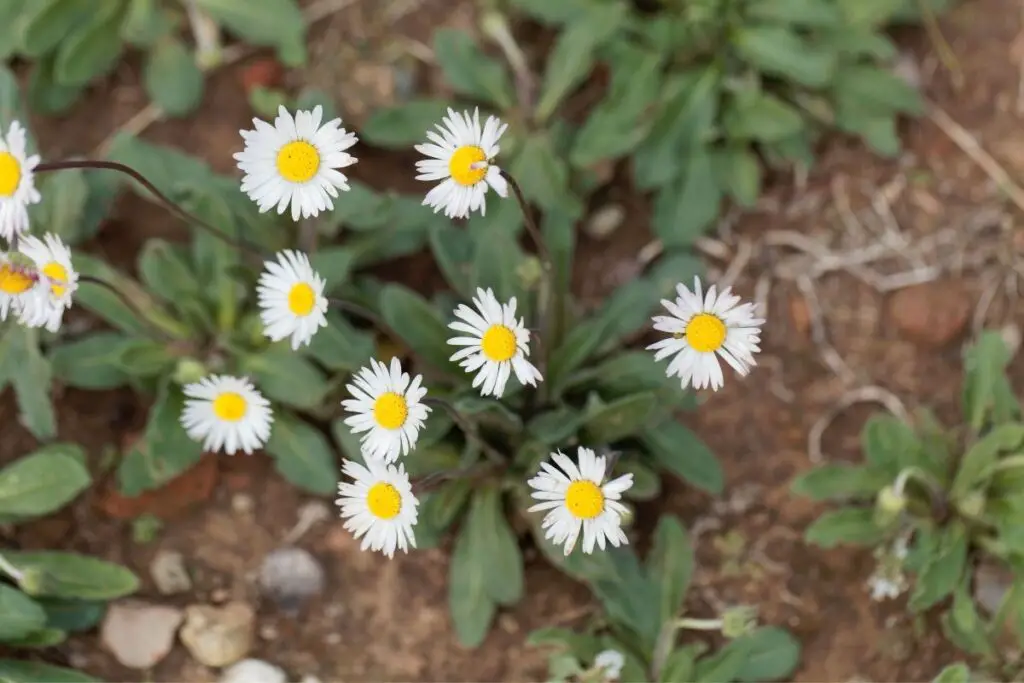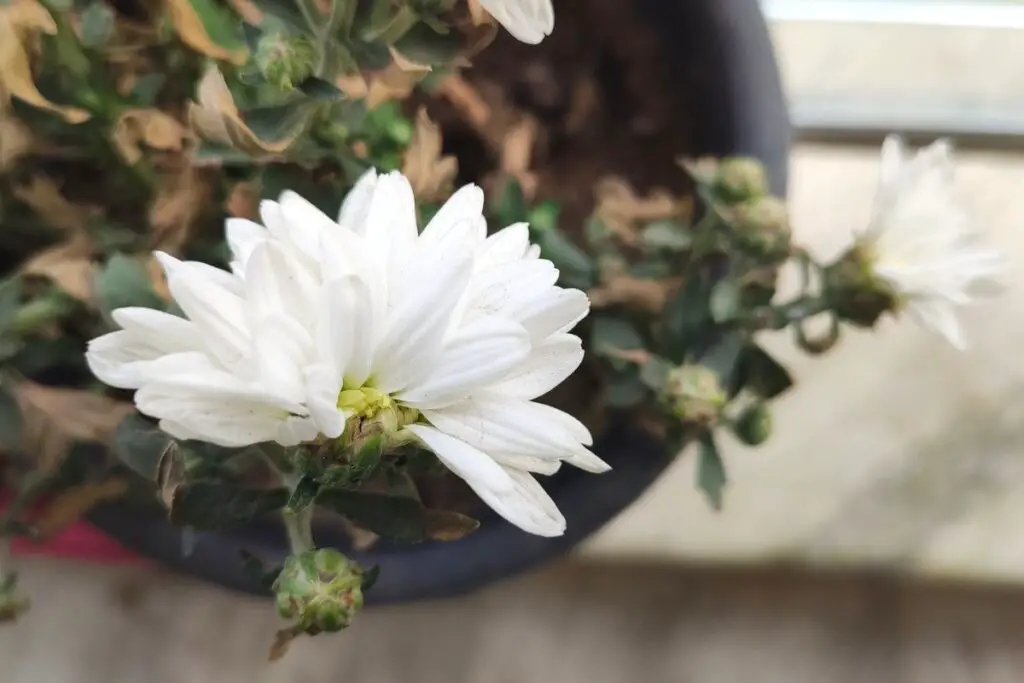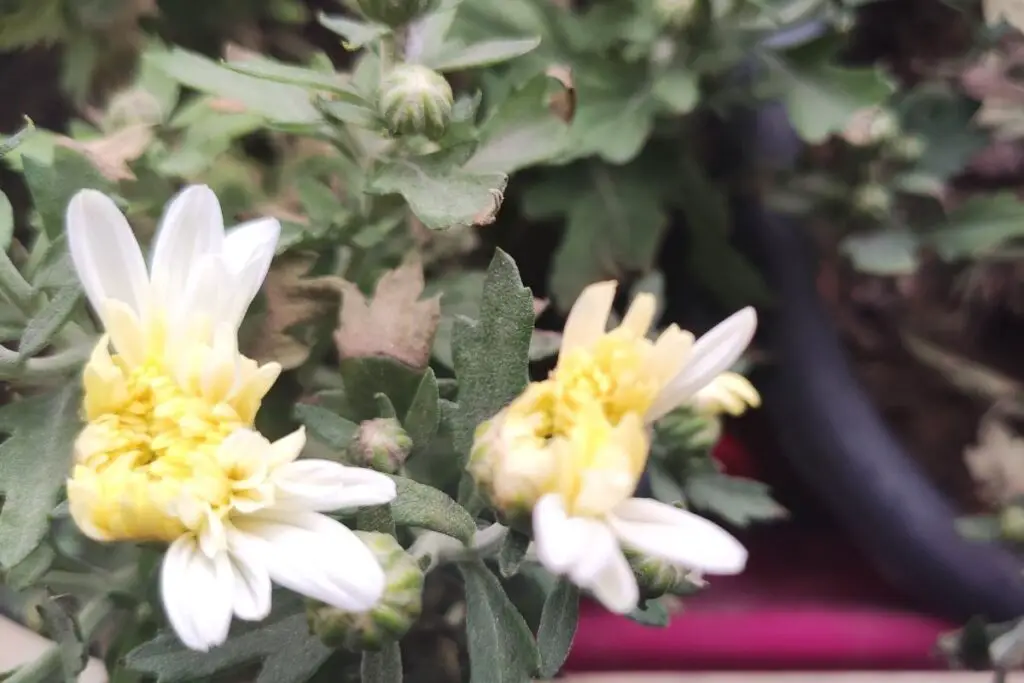Daisies start blooming in spring and summer, and they thrive on light and water. These plants love cool and moderate climates where they require a good amount of rain and plenty of sunlight to grow.
However, too much water can cause different problems for the plant if the soil is not light with good drainage. Let’s take a look at how much water do daisies need.
As a general rule, daisies require 1 to 2 inches of water every week in the summer season. If it is fall and early winter, it will need the same amount of water every other week. Generally, you only need to water your daisies if it doesn’t rain enough throughout the week.
It means you will have to keep tracking the water requirements of your daisies throughout the year as per the weather conditions and seasons.
As far as the watering is concerned, it can get a bit tricky with the daisies since they remain outdoors in the sun throughout the day, which can sometimes be deceiving. In this case, you will need to ensure that it receives optimum water because overwatering and underwatering can be problematic for your daisies.

How often should Daisies be watered?
Considering that it is a spring and summer blooming plant and thrives most during this season, you should water them at least once a week and on an average fortnightly. But if the plant receives enough water in the rainy season, you might not need to water them at all for a few weeks, as the soil remains damp those days.
Daisies love moist soil that is not muddy and soggy at all, so make sure the moisture level remains consistent and should not be flaky either. During the hot summer days, you will need to watch for the flakiness every other day because the moisture can dry out as the sun beats down hard on the soil and the plant.
If the daisies are planted in clay-based soil, they will retain the moisture for an extended period and will not require frequent irrigation. But, if the soil is sandy and drains well, it can dry out in hot summer conditions and require more watering.
You can apply a layer of mulch, considerably 2 inches, if the soil dries out quickly. That will help retain moisture for a more extended period, and the plant will not starve for water. You can even use the drip irrigation method to maintain the moisture level of the soil.
If you are unsure about the soil’s moisture level, you can use a moisture meter to check the soil’s moisture and water accordingly. You can make sure that the daisies are growing well and thriving in this way.
Things to keep in mind:
These are a few things you can be aware of while watering your daisies:
Proper drainage
Make sure that the clay content in the soil is not too much because it can make it muddy and soggy on rainy days that your daisies might not like, and their roots might start to rot due to this reason.
Therefore, the balance of sand and clay shall be there. It should be more of a sandy soil which will provide good drainage and hold enough moisture for the plant to remain healthy.
Check the moisture
Yes, the drainage should be good, but you cannot let it dry completely. Daisies love to grow and multiply. So, they require a constant supply of moisture to maintain the water balance.
You need to check the soil every other day and check the moisture by merely touching the soil at the plant base. If you feel it is wet and moist, you can wait before you water it next time.
It will help if you make sure that there is no water logging at the plant base during rains, and the excess water can drain quickly.
Factors determining Daisy’s water requirement

Multiple factors determine the water requirement of the daisies. You will need to look into some of the factors mentioned below while watering the daisies.
Looking for gardening supplies? We have tested 100's of products before recommending them to you guys. Check out our best pick below:
| Image | Gardening Supplies | Best Price? |
|---|---|---|
 Top
Top Top
Top | Raised Garden Bed Kit | Check On Amazon |
 | XLUX Soil Moisture Meter, Plant Water Monitor, Soil Hygrometer Sensor for Gardening, Farming, Indoor and Outdoor Plants, No Batteries Required | No Results |
 Top
Top Top
Top | 82 Pcs Garden Tools Set and Extra Succulent Tools Set | Check On Amazon |
 | Joeys Garden Expandable Garden Hose with 8 Function Hose Nozzle, Lightweight Anti-Kink Flexible Garden Hoses, Extra Strength Fabric with Double Latex Core, (50 FT, Black) | No Results |
 Top
Top Top
Top | Dual Chamber Compost Tumbler | Check On Amazon |
 Top
Top Top
Top | Sunnyglade Plant Stakes | Check On Amazon |
 Top
Top Top
Top | Organic Cold Pressed Neem Seed Oil | Check On Amazon |
 Top
Top Top
Top | Mighty Mint Gallon :-Insect and Pest Control Peppermint Oil | Check On Amazon |
 Top
Top Top
Top | Scotts DiseaseEx Lawn Fungicide | Check On Amazon |
 Top
Top Top
Top | Jacks Classic 20-20-20 All Purpose Fertilizer | Check On Amazon |
 Top
Top Top
Top | 30,000 Seeds Pollinator Attracting Wildflower Mixture | Check On Amazon |
 Top
Top Top
Top | Survival Vegetable Seeds Garden Kit-Over 16,000 Seeds | Check On Amazon |
Light
Sunlight plays a vital role in determining the water requirements of the daisies. These plants thrive on direct sunlight.
It will help if you plant daisies in those spots in your garden where they receive a lot of sunlight throughout the day.
Lack of light not only hinders the growth of the plant but also makes the soil soggy. Low light can prove to be fatal for your daisies, causing root rot and many other ailments.
If you notice that the weather is not as bright and sunny, and is dull throughout the week, avoid regular irrigation or water less than usual. But if the plant is receiving an adequate amount of light, you can water it as normal.
Also read: How Much Light Do Daisies Need? (Daisy Light Requirements)
Humidity
Daisies like moderate humidity with a cool temperature and don’t like scorching and dry conditions.
Low humidity can make them feel dry, and they might look dull with drooping leaves.
In that case, you can use the drip irrigation method and can also provide a temporary shade if the sun is too harsh in the summers. Applying mulch on the soil will also help to maintain moisture levels.
But if the soil feels completely dry and flaky, you will need to water it immediately.
Temperature
The daisies will need a maximum amount of water during the summer. You will have to water them at least once a week to ensure that the soil holds up moisture.
Depending on the transition of the seasons, you need to maintain a constant moisture level in the soil for the daisies to thrive and bloom beautifully.
Season
With the arrival of spring, the daisies start growing faster and start to bloom too. They keep growing throughout the spring and summer and need a maximum amount of water during this period.
But when the fall approaches, their water requirement reduces, and they need less water during the winters.
Drainage
A mix of sandy soil and humus with some compost will provide the best drainage for the daisies and maintain enough moisture in the soil, avoiding the sogginess.
If the clay content is more in your garden soil, try to mix some sandy soil where you want to plant the daisies so that the base of the plant remains soft and moist enough for the roots to grow strong and deep.
Health
Depending on the current health of the plant, the water requirements can also vary.
If the plant is suffering from stunted growth, you need to check if the soil is too damp or too dry.
If it is too dry, you need to water it, adding some manure and compost to the soil.
If the soil is too wet, you will have to give it some time to recover from the ailment, and it will need some good sunlight.
How much water do daisies need?
Since the daisies love direct sunlight and thrive during spring and summer, they need quite a lot of water during this season. The daisies need water at least once a week, but if it rains once or twice a week, you can skip watering that week.
During winter, it will require less water, that is once or twice a month.
To sum it up, the water requirement of the daisies depends on the following:
Size of the plant: These plants can grow to become dense. So, water them accordingly. The thicker they are, the more water they will require.
Living conditions: If you live in hot and dry climatic conditions, watering the plant every week will be mandatory. You can also use drip irrigation to maintain the moisture in the soil, but if the climatic conditions are moderate and cool less water will do for the plants.
What happens if you overwater daisies?

Overwatering can cause many problems for the daisies. And if the drainage capacity of the soil is not good enough in your garden, it can cause problems for the plants.
If you don’t resolve this issue on time, the plants will suffer root rot and eventually die down.
Signs of overwatering in daisies:
Root system will fail: Overwatering can drown the plants. If the roots are immersed in water for a long time, the plant’s oxygen supply will reduce, and the plant will not be able to breathe.
Soft and limp leaves: Too much water will destroy the moisture balance of the plant, and the leaves will become weak and droopy.
Increase in water pressure: Water pressure can increase, which can cause the cells of the leaves to die.
Stunted growth: Yellow leaves and stunted growth are also a symptom.
How do you fix overwatered daisies?
To fix an overwatered daisy you can follow these steps:
- You can leave the plant in the sun for a few weeks and let it heal and get dry naturally.
- If there are severe symptoms, you might need to dig the plant and plant it in a place where it is dry so that the moisture evens out in a few days.
Signs of underwatered daisies
If you forget to water your daisies for a week or two, you will undoubtedly notice under-watered plants if it is summer. But dealing with it is not as tricky as overwatering.
Symptoms:
- Drooping leaves: The leaves and flowers will droop and look dull due to lack of moisture.
- Falling leaves: The older leaves can fall off earlier than the due time. This situation can be fatal for the plant if not watered on time.
How to fix under watered daisies?
You will need to take care of the following if your daisies are underwatered:
- If they are not growing and the leaves are smaller, and the soil is dry and flaky, you will have to water them immediately so that they can recover.
- Water the plants regularly (weekly or fortnightly) as per the conditions and season.
- Increase the volume of water if the drainage is good enough; that will solve the problem.
- Implement dripping irrigation to maintain the moisture and revive the plant.
Final Words
Watering your daisies shall not be much of a problem for you as these plants don’t seek water every day.
It does not mean that you will plant it in a corner in your garden and forget it. You will have to keep visiting it at least once a week to make sure it is growing and flourishing well.
It is your little plant, so it will need your care and attention along with regular watering (1 to 2 inches of water) and bright sunlight.
Once it grows bigger and denser, it will become sturdy, but it will still need a sufficient amount of water in the summers to bloom.
Make sure that you don’t overwater it, especially in the rainy season.
Ref: Wikipedia, Britannica, University Of Florida, Ucanr.edu

I have had a problem with my beautiful daisies for several years now and it seems no one knows what it is or to do. The centers of the daisies turn black very soon after blooming and shortly afterwards die. I prune the dead ones off and still get a few new ones, but it is so sad to watch them only look gorgeous for a few weeks. I used to have them almost all summer. Am I watering too much, too little…? The ground is not particularly well aerated. I go out every night to remove the nocturnal pincher bugs. I hate losing my gorgeous daisies after only a few weeks. Even my neighbors love seeing them. Thanks!
Hey, thanks for taking time out to go through our blog post. I think i know what’s going on with your daisies.
It sounds like your daisies may be suffering from a fungal disease called verticillium wilt, which can cause the centers of the flowers to turn black and die. This disease is caused by a soil-borne fungus that can persist in the soil for many years.
To address this issue, you can try the following steps:
Improve soil drainage: Verticillium wilt thrives in moist soil, so improving soil drainage can help reduce the risk of infection. You can add organic matter to the soil, such as compost or aged manure, to improve soil structure and drainage.
Avoid overwatering: Water your daisies deeply but infrequently, and avoid overwatering which can create a moist environment that promotes fungal growth.
Remove infected plants: If you notice any plants with blackened centers, remove them immediately to prevent the spread of the disease.
Rotate crops: If you are growing other plants in the same area, try rotating your crops to prevent the buildup of soil-borne pathogens.
Consider using fungicides: If the problem persists, you may need to use a fungicide to treat the soil and prevent further infection. Be sure to follow the instructions carefully and use a product that is safe for your plants.
As for the nocturnal pincher bugs, they are not likely to be causing the blackening centers of the daisies. However, removing them can help prevent other pest problems. You can try using a physical barrier, such as row covers or netting, to keep the insects away from your plants.
I hope these tips help you restore your daisies to their former glory.